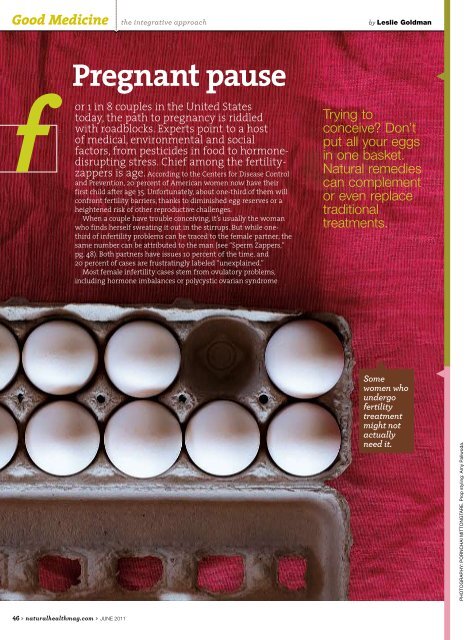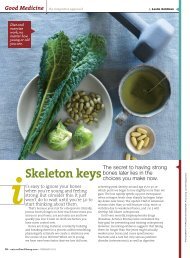Pregnant pause - Leslie Goldman
Pregnant pause - Leslie Goldman
Pregnant pause - Leslie Goldman
Create successful ePaper yourself
Turn your PDF publications into a flip-book with our unique Google optimized e-Paper software.
Good Medicine<br />
the integrative approach<br />
by <strong>Leslie</strong> <strong>Goldman</strong><br />
f<br />
<strong>Pregnant</strong><br />
<strong>pause</strong><br />
or 1 in 8 couples in the United States<br />
today, the path to pregnancy is riddled<br />
with roadblocks. Experts point to a host<br />
of medical, environmental and social<br />
factors, from pesticides in food to hormonedisrupting<br />
stress. Chief among the fertilityzappers<br />
is age. According to the Centers for Disease Control<br />
and Prevention, 20 percent of American women now have their<br />
first child after age 35. Unfortunately, about one-third of them will<br />
confront fertility barriers, thanks to diminished egg reserves or a<br />
heightened risk of other reproductive challenges.<br />
When a couple have trouble conceiving, it’s usually the woman<br />
who finds herself sweating it out in the stirrups. But while onethird<br />
of infertility problems can be traced to the female partner, the<br />
same number can be attributed to the man (see “Sperm Zappers,”<br />
pg. 48). Both partners have issues 10 percent of the time, and<br />
20 percent of cases are frustratingly labeled “unexplained.”<br />
Most female infertility cases stem from ovulatory problems,<br />
including hormone imbalances or polycystic ovarian syndrome<br />
Trying to<br />
conceive? Don’t<br />
put all your eggs<br />
in one basket.<br />
Natural remedies<br />
can complement<br />
or even replace<br />
traditional<br />
treatments.<br />
Some<br />
women who<br />
undergo<br />
fertility<br />
treatment<br />
might not<br />
actually<br />
need it.<br />
PHOTOGRAPHY: PORNCHAI MITTONGTARE. Prop styling: Amy Paliwoda.<br />
46 naturalhealthmag.com june 2011
Good Medicine<br />
(PCOS), a hormonal disorder characterized by<br />
irregular periods, excess hair growth and acne.<br />
Others face thyroid disease; mechanical issues<br />
like blocked fallopian tubes; or endometriosis, a<br />
painful disorder in which the uterine lining grows<br />
outside the uterus. Certain culprits, including<br />
blocked tubes or very low sperm counts, require<br />
surgery or assisted reproductive techniques<br />
like in vitro fertilization (IVF). But some experts<br />
say a quick-fix mentality on the part of both<br />
patients and physicians has contributed to an<br />
over-reliance on IVF, which costs about $12,000<br />
per cycle and can be exceptionally taxing on a<br />
woman’s body, emotions and relationships.<br />
A growing number of practitioners are<br />
advocating a blend of holistic care with<br />
mainstream reproductive endocrinology.<br />
“Lifestyle is a huge factor,” says Sami S. David,<br />
M.D., assistant professor of reproductive medicine<br />
at Mount Sinai Medical Center in New York City<br />
and co-author of Making Babies: A Proven 3-Month<br />
Program for Maximum Fertility (Little Brown).<br />
While you can’t change your age, you can<br />
control the foods you eat, the way you handle<br />
stress and your environment. We asked the<br />
experts—many of whom used a combination<br />
of traditional and complementary approaches<br />
to surmount their own fertility challenges—for<br />
their top recommendations. Choose the methods<br />
that suit your physical or emotional needs; if<br />
you haven’t conceived after three to six months<br />
(depending on your age and patience level),<br />
consult a reproductive endocrinologist.<br />
Stress less<br />
“People going through infertility have similar<br />
stress levels to cancer, AIDS and heart disease<br />
patients,” says Alice Domar, Ph.D., executive<br />
director of the Domar Center for Mind/Body<br />
Health at Boston IVF and author of Conquering<br />
Infertility (Penguin). The link between stress<br />
and infertility is hotly debated—a recent study<br />
Sperm like<br />
it cool: Buy<br />
him some<br />
boxers.<br />
Reducing<br />
stress won’t<br />
guarantee<br />
success, but<br />
it can make<br />
“trying” less<br />
trying.<br />
Sperm zappers<br />
American men’s sperm<br />
counts are dropping, thanks<br />
to obesity, prenatal chemical<br />
exposure and other factors.<br />
Fortunately, men can benefit<br />
from lifestyle modifications in<br />
as few as three months, as<br />
they continually generate new<br />
sperm. Encourage your man<br />
to adopt these changes:<br />
Stop smoking This habit<br />
damages sperm DNA.<br />
Check out his meds Some<br />
blood pressure drugs lower<br />
sperm count. Other common<br />
culprits: diuretics and ulcer,<br />
epilepsy and antifungal meds.<br />
Reduce stress A 2010 study<br />
published in Fertility and<br />
Sterility found an inverse<br />
relationship between stress<br />
and sperm quality.<br />
Keep ’em cool Don’t use the<br />
laptop on the lap or keep the<br />
cellphone in pants pockets.<br />
Be fruitful and multiply<br />
Antioxidant-rich, produceheavy<br />
diets (as well as<br />
antioxidant supplements)<br />
have been shown to improve<br />
sperm quality.<br />
BPA<br />
exposure<br />
and heavy<br />
alcohol or<br />
marijuana<br />
use can zap<br />
sperm.<br />
PHOTOGRAPHY: (clockwise from top) DORLING KINDERSLEY/GETTY IMAGES; CSA PLASTOCK/CSA IMAGES/GETTY IMAGES; PANDO HALL/PHOTOGRAPHER’S CHOICE RF/GETTY IMAGES.<br />
naturalhealthmag.com june 2011
Good Medicine<br />
in the British Medical Journal, for example,<br />
found no link between emotional distress and<br />
IVF failure. But many experts believe chronic<br />
stress has hijacked our primitive fight-orflight<br />
response, causing the pituitary gland to<br />
unnecessarily release endorphins that suppress<br />
reproductive hormones.<br />
A landmark 2000 Harvard Medical School<br />
study found that women who participated<br />
in a 10-week mind-body program, including<br />
relaxation and yoga, were nearly three times<br />
more likely to conceive than women who<br />
didn’t. And a 2009 Domar-led study found that<br />
women who took part in a mind-body stress<br />
management program before or during their<br />
second IVF cycle had a 160 percent higher pregnancy<br />
rate compared with those who did not.<br />
Strike a pose “Yoga reduces the stress<br />
hormone cortisol and induces the relaxation<br />
response,” explains Tami Quinn, a registered<br />
yoga teacher and co-founder of the Chicagobased<br />
holistic fertility center Pulling Down the<br />
Moon. Specific poses, such as Viparita Karani<br />
(Legs up the Wall), can also increase blood<br />
flow to the ovaries and uterus, potentially<br />
thickening the uterine lining; this can help<br />
with embryo implantation. Stick with gentle<br />
hatha or restorative yoga—this is not the time<br />
for Bikram (“hot”) yoga. Try: Pulling Down the<br />
Moon’s Yoga Practices for Fertility DVD<br />
($25; pullingdownthemoon.com)<br />
On pins and needles A 2008 British<br />
Medical Journal study found that women who<br />
underwent IVF and acupuncture together<br />
were 65 percent more likely to conceive than<br />
women who only underwent IVF. According to<br />
acupuncturist-herbalist and Making Babies coauthor<br />
Jill Blakeway, L.Ac., acupuncture works<br />
by promoting uterine blood flow. It can also<br />
quiet post-IVF uterine contractions, encouraging<br />
implantation, and decrease levels of cortisol<br />
(a “stress hormone”) and prolactin; both are<br />
known to disrupt reproductive function.<br />
Healthy fats<br />
are fertilityfriendly.<br />
Like yoga,<br />
guided<br />
imagery can<br />
focus and<br />
calm your<br />
mind. Try<br />
visualization<br />
CDs from<br />
circlebloom<br />
.com.<br />
Eat to conceive<br />
Jorge E. Chavarro, M.D., Sc.D., an assistant<br />
professor of nutrition and epidemiology at the<br />
Harvard School of Public Health and author<br />
of The Fertility Diet (McGraw-Hill), followed<br />
18,000 participants in the long-running<br />
Harvard Nurses’ Health Study who were trying<br />
to get pregnant. Among his findings:<br />
Get your protein from plants Foods that<br />
elevate insulin levels contribute to ovulatory<br />
disorders. “Not all proteins are digested the<br />
same,” Chavarro explains. “Animal proteins<br />
require more insulin to be secreted.” Beef and<br />
poultry, specifically, were associated with<br />
infertility, but replacing 25 grams of animal<br />
protein with 25 grams of plant protein (beans,<br />
peas, nuts) was related to a 50 percent lower<br />
risk of ovulatory infertility.<br />
Ban trans fats Found primarily in packaged<br />
baked and fried foods, trans fats elevate insulin<br />
levels. Monounsaturated fats, like those found<br />
in avocados, nuts and olive oil, are associated<br />
with a decreased risk of infertility.<br />
Avoid sugar spikes Quickly digested carbs,<br />
such as white bread, potatoes and soda, spike<br />
blood sugar, promoting insulin secretion.<br />
Carolyn Dean, M.D., N.D., co-author of The<br />
Yeast Connection and Women’s Health (Future<br />
Health), dislikes these carbs for another<br />
reason: They encourage yeast overgrowth.<br />
“Yeast toxins can cross-react with hormones<br />
necessary for pregnancy, blocking their<br />
receptor sites,” she says. Dean recommends<br />
Can the cola:<br />
Blood sugar<br />
spikes lead<br />
to ovulation<br />
problems.<br />
PHOTOGRAPHY: (clockwise from top) SAWAYASU KEITH TSUJI/PHOTODISC/GETTY IMAGES; TERTRA IMAGES/GETTY IMAGES; YAGI STUDIOS/PHOTODISC/GETTY IMAGES.<br />
50 naturalhealthmag.com june 2011
Good Medicine<br />
Cacao and<br />
some other<br />
plant foods<br />
contain<br />
magnesium,<br />
which may<br />
facilitate<br />
conception.<br />
address elevated follicle stimulating hormone<br />
(FSH) levels, repeat miscarriage, unexplained<br />
infertility and PCOS, says Oakland, Calif.-<br />
based acupuncturist and herbalist Zoe<br />
Cohen, L.Ac. Multicomponent formulas are<br />
generally tailored for each patient based on<br />
her diagnosis. Cohen cautions that herbs can<br />
be deceptively powerful and may interact<br />
with fertility drugs, so be sure to see a licensed<br />
herbalist experienced in treating infertility.<br />
Blend in a bottle Not ready to jump<br />
head-first into Chinese herbs? Stanford<br />
University School of Medicine researchers<br />
found that FertilityBlend, a combination of<br />
prenatal vitamins and fertility-enhancing<br />
herbs, increases the chances of conceiving.<br />
(FertilityBlend for Men boosts sperm count.)<br />
Try: FertilityBlend for Women ($30 for 90<br />
capsules; fertilityblend.com)<br />
eliminating sugar and white flour, eating fiberrich,<br />
slowly digested complex carbohydrates<br />
and incorporating plain yogurt or probiotic<br />
supplements to encourage the growth of<br />
healthy gastrointestinal bacteria, which<br />
favorably compete with yeast toxins for space.<br />
Try: Culturelle Probiotics ($15 for 30 capsules,<br />
vitacost.com) or Lifeway plain organic kefir<br />
($5 for 32 ounces; lifeway.net)<br />
Tea up A study published in the American<br />
Journal of Public Health found that tea drinkers<br />
doubled their odds of conceiving, perhaps<br />
because of tea’s antioxidant content. Note:<br />
Blakeway advises avoiding red raspberry leaf<br />
tea because it is linked to miscarriage.<br />
Supplement smartly<br />
Mellow magnesium This mineral is thought<br />
to keep the fallopian tubes relaxed, facilitating<br />
the travel of sperm to meet egg. In IVF, it can<br />
calm the uterus to encourage implantation.<br />
Dean suggests getting 750 milligrams daily.<br />
The mineral is also found in seaweed, cacao,<br />
leafy greens, nuts and seeds. Try: Natural<br />
Calm Magnesium Citrate ($23 for 16 ounces;<br />
calmnatural.com)<br />
Something fishy Holistic nutritionist Sally<br />
Kravich, M.S., CNHP, recommends fish oil (800-<br />
plus milligrams EPA and 500-plus milligrams<br />
DHA per day) to balance your hormones and<br />
encourage healthy fetal brain development.<br />
Try: Nordic Naturals Ultimate Omega ($60 for<br />
180 softgels; vitaminshoppe.com)<br />
Helpful herbs Chinese herbs are often<br />
used in conjunction with acupuncture to<br />
Laughter<br />
might<br />
be good<br />
medicine for<br />
infertility.<br />
Clean up your act<br />
Many of the chemicals in products we use<br />
every day contain endocrine-disrupting<br />
compounds called xenoestrogens, which mimic<br />
estrogen in the body and block real estrogen<br />
from doing its work (bisphenol-A, or BPA, and<br />
phthalates are two examples). High blood levels<br />
of the chemicals used in nonstick cookware<br />
and waterproof clothing have been shown to<br />
significantly increase female infertility risk.<br />
David suggests eating organic foods and<br />
Send in the clowns An<br />
Israeli study found that women<br />
who were visited by “medical<br />
clowns” immediately following<br />
IVF embryo transfer were more<br />
likely to conceive than patients<br />
who missed out on the laughs.<br />
PHOTOGRAPHY: (from left) MISSOURI BOTANICAL GARDEN; CONSTANCE BANNISTER CORP/ARCHIVE PHOTOS/GETTY IMAGES.<br />
52 naturalhealthmag.com june 2011
Good Medicine<br />
keeping your home as green as possible: Avoid<br />
microwaving in plastic containers, steer clear<br />
of cosmetics containing phthalates or parabens<br />
and include phytoestrogens, such as flaxseed<br />
or soy, in your diet; they’ll bind to the estrogen<br />
receptor sites before xenoestrogens can.<br />
Avoid weight extremes<br />
According to the American Society for<br />
Reproductive Medicine, 12 percent of female<br />
infertility cases are a result of weighing too<br />
little or too much. That’s because estrogen is<br />
produced in fat cells. Too little body fat and the<br />
body can’t produce enough estrogen to fuel<br />
ovulation; too much and the body reacts as if it<br />
were on hormonal birth control. Gaining just<br />
6 to 8 pounds (if underweight) or losing 10 to<br />
14 pounds (if overweight) may do the trick.<br />
Exercise in moderation<br />
David recommends gentle exercise, avoiding<br />
workout intensities that elicit an endorphin<br />
rush, as this may suppress hormone and<br />
egg production. A 2006 study in Obstetrics<br />
& Gynecology found that IVF patients who<br />
reported exercising four hours or more per<br />
week for one to nine years were 40 percent less<br />
likely to have a live birth than women who did<br />
not exercise. Women are advised not to work<br />
out while undergoing IVF treatment because<br />
doing so could harm the ovaries.<br />
<strong>Leslie</strong> <strong>Goldman</strong> is a health writer in Chicago.<br />
Stick<br />
with oldfashioned<br />
cleaning<br />
methods.<br />
Moderate<br />
exercise<br />
reduces<br />
stress while<br />
promoting<br />
circulation<br />
to the pelvic<br />
region.<br />
PHOTOGRAPHY: (from top) ALFRED GESCHEIDT/RISER/GETTY IMAGES; URS/KUESTER/PHOTONICA/GETTY IMAGES.<br />
54




